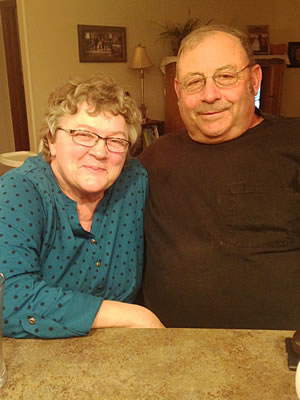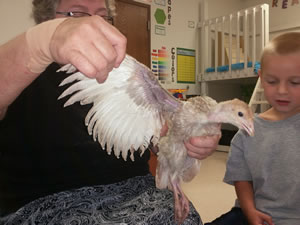Ask a child what they want to be when they grow up and farmer probably won’t make the list.
Market pressures and increased costs have pushed the job outlook for the occupation to decline by 19 percent from 2012 to 2022 in the United States, according to the U.S. Bureau of Labor Statistics. Along with fewer farmers, a 2013 USDA Economic Research Service report showed mid-sized farms are decreasing and farms are becoming more specialized. That leaves some children thinking farmers only raise corn and soybeans, said Sharon Brandt, of the Doug and Sharon Brandt Farm near Avon, S.D.

Sharon’s advice: “Don’t let the world put you in a box.”
A farm tour of Sharon’s and her husband Doug’s roughly 800 acres would show diversity can thrive in the area. They have the corn and soybean fields, but also fields of barley, triticale, alfalfa and grass. Then there are the animals. They have chickens, ducks, turkeys, swine, sheep and cattle. Sharon shows what they grow to teachers and children in area schools. They put each new kind of crop they grow in pint jars that has amounted to a 15-to-20 jar display.
“They’re like, whoa, there’s all this,” Sharon said.
Sharon said she found a love for teaching after having four children. She said her desire was to stay home and help Doug with the family and the farm. Now Sharon has grandchildren and she said her daughter, Sheila, a teacher, asked for help in her classroom. Sharon’s volunteer teaching has expanded to different grades and schools. Her projects have included egg incubating and worm compost bins.
Some of the students say they want to grow up to be farmers, she said, but that opportunity is more often passed down through generations. Farming was an incredible way to teach her children to work because there was plenty of work, Sharon said. At the time they grumbled a lot, but she said they’re thankful because they know how to work and they have good jobs.

Their son, Gregg, is a counselor on the long-term adolescent unit at the Mickelson Neuroscience Hospital in Yankton, S.D. Their next son, Brian, works at the same facility as a nurse manager. Their daughter, Julie, is a pediatric registered nurse at the Blank Hospital in Des Moines, Iowa, and Sheila is a teacher at the Wagner Community School in Wagner, S.D.
Doug and Sharon are trying to get their children involved in agriculture as they continue their own education in farming. The Brandts went to a Neal Kinsey workshop when they first became certified organic by the Organic Crop Improvement Association, about 16 years ago.
“You have to think for yourself,” Doug said, “but you have to find someone you can truly trust.”
Kinsey wasn’t selling products, but had been all over the world balancing soils. South Dakota OCIA 1 chapter, which Doug and Sharon are members, hosted the workshop and they’re hosting an advanced Kinsey course at Sioux Falls, S.D., Jan. 26 to 28. One of their sons was reading Kinsey material to attend the course with Doug and Sharon.
Besides getting their family more into farming, a goal of the Brandt’s continuing education is understanding why they have pressure from Canadian thistle, Sharon said. They had every one of their fields’ soil tested. The soil tests showed most of the fields where high in calcium.
Doug invited other organic farmers to listen when David Nelson, a crop advisor following the Kinsey-Albrecht System for soil health, came to talk about the soil test results. Nelson suggested some inputs that are approved for organic operations. The thistle pressure had to get better or the Brandts couldn’t farm organically, which would be the worst thing they could do, Sharon said. She said she thought 95 percent of the land hadn’t had prohibited inputs applied, which made the transition to organic farming easier.
She said Doug was interested in organic agriculture since the 70s, but it wasn’t until a market crash in the 90s that sent hog prices to 8 cents that they made the transition. Sharon said Doug saw the crash coming and that was the time to try to certify their farm as organic.
“We had to figure out, how are we going to generate more income with the amount of acreage that we’re farming?” she said.
A lot of people who ask Doug about organic farming want to know the price he gets for his goods, but he said that’s the wrong approach. His advice for people starting out in organic farming is to stay out of debt and “just do it.”
“If you’re going to do it for the money, don’t do it,” Doug said. “You do it because you believe it.”
CONTACT
Date Published: January 8, 2016
Author/Title: Demetria Stephens
E-Mail: sandnuri@gmail.com
Phone: (785) 678-2475
Address: 2852 F Lane
Jennings, KS 67643
